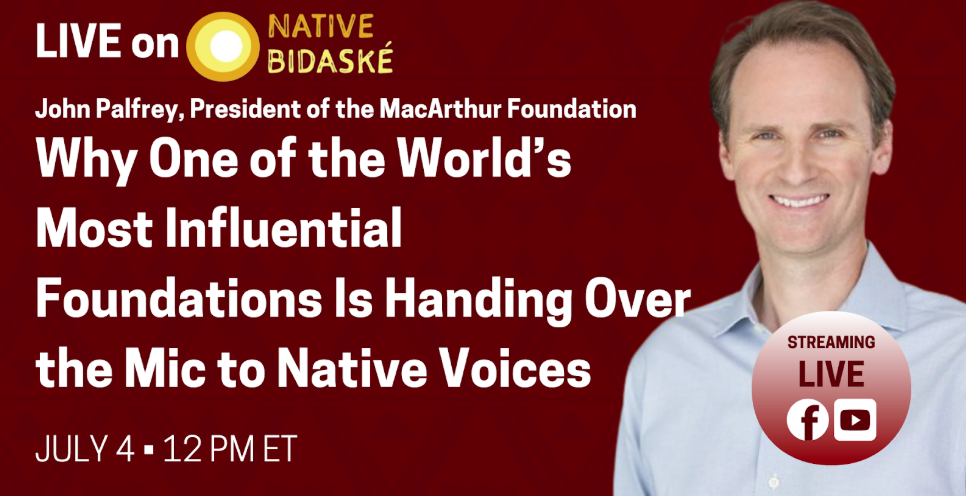
- Details
- By Native StoryLab
Only five cents of every $100 in U.S. philanthropy reaches Native communities. One of the wealthiest foundations in the world wants to change that and not by writing bigger checks, but by fundamentally shifting who’s in charge.
The MacArthur Foundation, best known for its “genius” grants, has quietly launched a bold new initiative: a Native self-determination program aimed at increasing funding for Indigenous communities. But this isn’t just another grant program. The foundation, with more than $8 billion in assets, says it’s rethinking how decisions are made, who makes them, and what philanthropy looks like when it’s led by the people it’s meant to serve.
That kind of language might sound familiar. But this time, something feels different.
This initiative wasn’t rolled out in a press release and forgotten a week later. It came after more than two years of private conversations, over 100 of them, with Native artists, scientists, entrepreneurs, and knowledge keepers. It followed a commissioned study that laid bare a painful truth: Native communities aren’t just underfunded. They’ve been systematically excluded from philanthropic power.
So MacArthur is doing something that few legacy institutions have dared to try:
It’s handing over the reins. Native leaders are helping to shape the strategy, design the operations, and determine where the money goes.
Even the foundation’s physical space is changing.
At its headquarters, a historic building in downtown Chicago, MacArthur has partnered with Native artists and the Center for Native Futures to install a rotating gallery of Indigenous art. It’s not just decoration. It’s a public correction to the settler-colonial story etched into the building’s walls for over a century.
For Indian Country, this program could mean real power and a new kind of relationship with philanthropy.
Not one built on scarcity and gatekeeping, but on trust. Not one shaped by metrics alone, but by shared values and community-defined goals. And not one centered on what foundations want to give, but on what Native nations choose to build.
TUNE INTO NATIVE BIDASKÉ TO LEARN MORE:
Date: Friday, July 4th
Time: 12:00 pm ET / 11:00 am CT / 10:00 am MT / 9:00 am PT
Streaming on Facebook, YouTube, and the NNO website
Disclosure: Native News Online has received grant funding from the MacArthur Foundation. The foundation had no involvement in the reporting or editing of this story or the Native Bidaské episode.
Help us tell the stories that could save Native languages and food traditions
At a critical moment for Indian Country, Native News Online is embarking on our most ambitious reporting project yet: "Cultivating Culture," a three-year investigation into two forces shaping Native community survival—food sovereignty and language revitalization.
The devastating impact of COVID-19 accelerated the loss of Native elders and with them, irreplaceable cultural knowledge. Yet across tribal communities, innovative leaders are fighting back, reclaiming traditional food systems and breathing new life into Native languages. These aren't just cultural preservation efforts—they're powerful pathways to community health, healing, and resilience.
Our dedicated reporting team will spend three years documenting these stories through on-the-ground reporting in 18 tribal communities, producing over 200 in-depth stories, 18 podcast episodes, and multimedia content that amplifies Indigenous voices. We'll show policymakers, funders, and allies how cultural restoration directly impacts physical and mental wellness while celebrating successful models of sovereignty and self-determination.
This isn't corporate media parachuting into Indian Country for a quick story. This is sustained, relationship-based journalism by Native reporters who understand these communities. It's "Warrior Journalism"—fearless reporting that serves the 5.5 million readers who depend on us for news that mainstream media often ignores.
We need your help right now. While we've secured partial funding, we're still $450,000 short of our three-year budget. Our immediate goal is $25,000 this month to keep this critical work moving forward—funding reporter salaries, travel to remote communities, photography, and the deep reporting these stories deserve.
Every dollar directly supports Indigenous journalists telling Indigenous stories. Whether it's $5 or $50, your contribution ensures these vital narratives of resilience, innovation, and hope don't disappear into silence.
 The stakes couldn't be higher. Native languages are being lost at an alarming rate. Food insecurity plagues many tribal communities. But solutions are emerging, and these stories need to be told.
The stakes couldn't be higher. Native languages are being lost at an alarming rate. Food insecurity plagues many tribal communities. But solutions are emerging, and these stories need to be told.
Support independent Native journalism. Fund the stories that matter.
Levi Rickert (Potawatomi), Editor & Publisher
